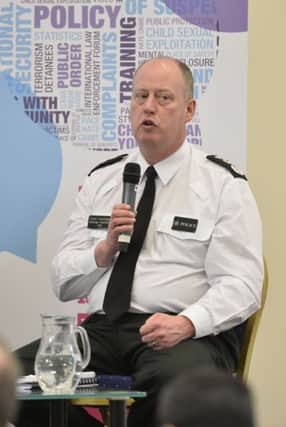Paramilitary-style attacks will be ‘hard to crack’


Mr Hamilton was speaking at Antrim PSNI Station as new policing districts came into effect to run alongside changes in local government areas.
There has been a surge of paramilitary-style attacks carried out by loyalists and dissident republicans in areas like Coleraine, north Antrim, Newtownabbey and Belfast.
Concern has been growing at the number of incidents.
Advertisement
Hide AdAdvertisement
Hide AdSpeaking in Antrim Station, which houses the PSNI’s Serious Crime Suite where terror suspects in Northern Ireland are quizzed, Mr Hamilton said: “We can never be complacent. It is a hard one to crack, there are challenges. Over night there was another paramilitary-style attack in Belfast so to say more needs to be done, yes it does, but it is not just for the police it is a much wider society problem.
“We constantly try to win confidence of the public so we have that legitimacy, policing with consent, which is important to us. We want people to report crime to us. We have the legitimacy, paramilitary groups don’t. We want victims to engage with us and co-operate with us to bring those responsible to justice.
“There are a number of measures to deal with intimidated and vulnerable witnesses that we have introduced over the last three or four years. There have always been some measures in place but we are in a much better place than we were but we still need people to have confidence in the police and in the system that if they come forward they will not be put in further jeopardy or further danger.”
The Chief Constable said paramilitary attacks can have deadly consequences like in the case of Brian McIlhagga from Ballymena who was shot dead in Ballymoney earlier this year.
Advertisement
Hide AdAdvertisement
Hide AdMr Hamilton added: “Unfortunately this is one of the legacy issues we deal with from our troubled past. People in paramilitary groups take it upon themselves to exercise this sort of power as judge, jury and sometimes executioner as we saw in Ballymoney recently.
“There is no legitimacy behind that. We must never allow ambivalence or complacency to creep in. When I talk about we I am talking about society, not just the police service.
“These people (paramilitaries) don’t have legitimacy and we should not give them any legitimacy even by being ambivalent. It is unacceptable, it is inhumane and apart from anything else it doesn’t work.
“This form of so-called justice is not justice at all and it doesn’t make communities safer, it doesn’t reduce anti-social behaviour or crime which is what the paramilitary groups often hide behind. It doesn’t work,” said Mr Hamilton.
Advertisement
Hide AdAdvertisement
Hide AdRegarding the changes to the policing districts, where the PSNI used to have eight policing districts but from April 1 it is now eleven to be co-terminus with the new super-council areas, the Chief Constable said: “We really believe in these changes which will deliver better policing, there is no question about that.
“We have lots of other constraints and challenges around that including the budget and doing so much change so quickly but the thing that gives me confidence is the quality of the people we have in leadership positions.”
Mr Hamilton added: “There are competing priorities around this. Ordinarily you wouldn’t move from eight business units to eleven if you are trying to squeeze out costs but what we have done is we have reconfigured how we do service delivery to make it more cost effective.”
Also speaking in Antrim, PSNI Assistant Chief Constable Stephen Martin, said: “There are some costs associated with any change whether it be I.T. costs, estate costs, and we will have incurred some of those but we have also taken steps to try and reduce costs for example our current eight district commanders are chief superintendents and our new 11 district commanders, ten of them will be superintendents, so we have reduced management costs.
Advertisement
Hide AdAdvertisement
Hide Ad“We are also trying to be more efficient with resources. So traditionally if you were attached to a particular district, by and large that was where you worked, so we are going to be much more agile, fleet-of-foot and flexible with our resources.
“Our police officers and staff will go to wherever the threat, harm or a particular risk sits and that allows us to be more clever around our deployment so inevitably there are some costs but the way we have configured it in the medium to long term and we think the way we do it will allow us to be somewhat cheaper.”